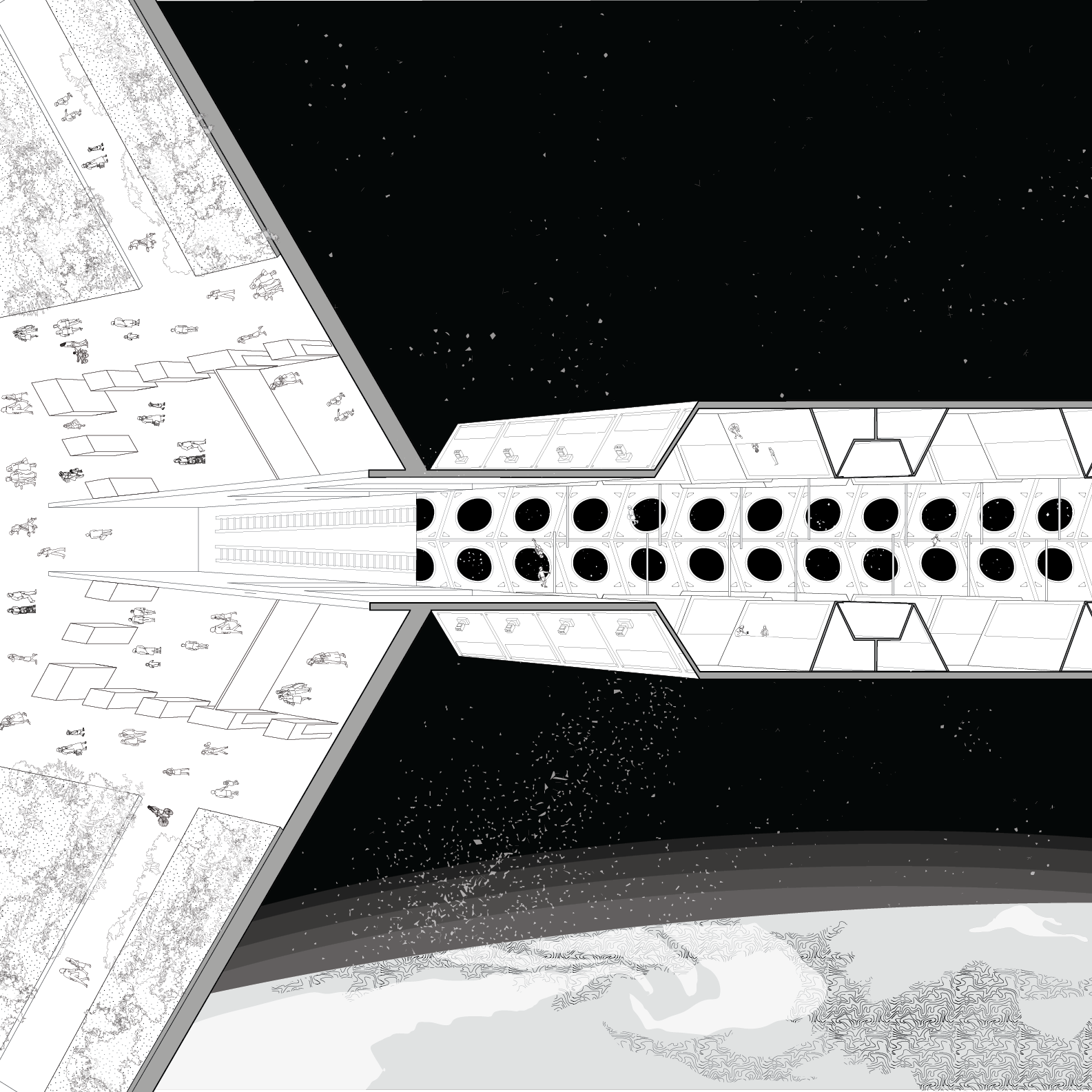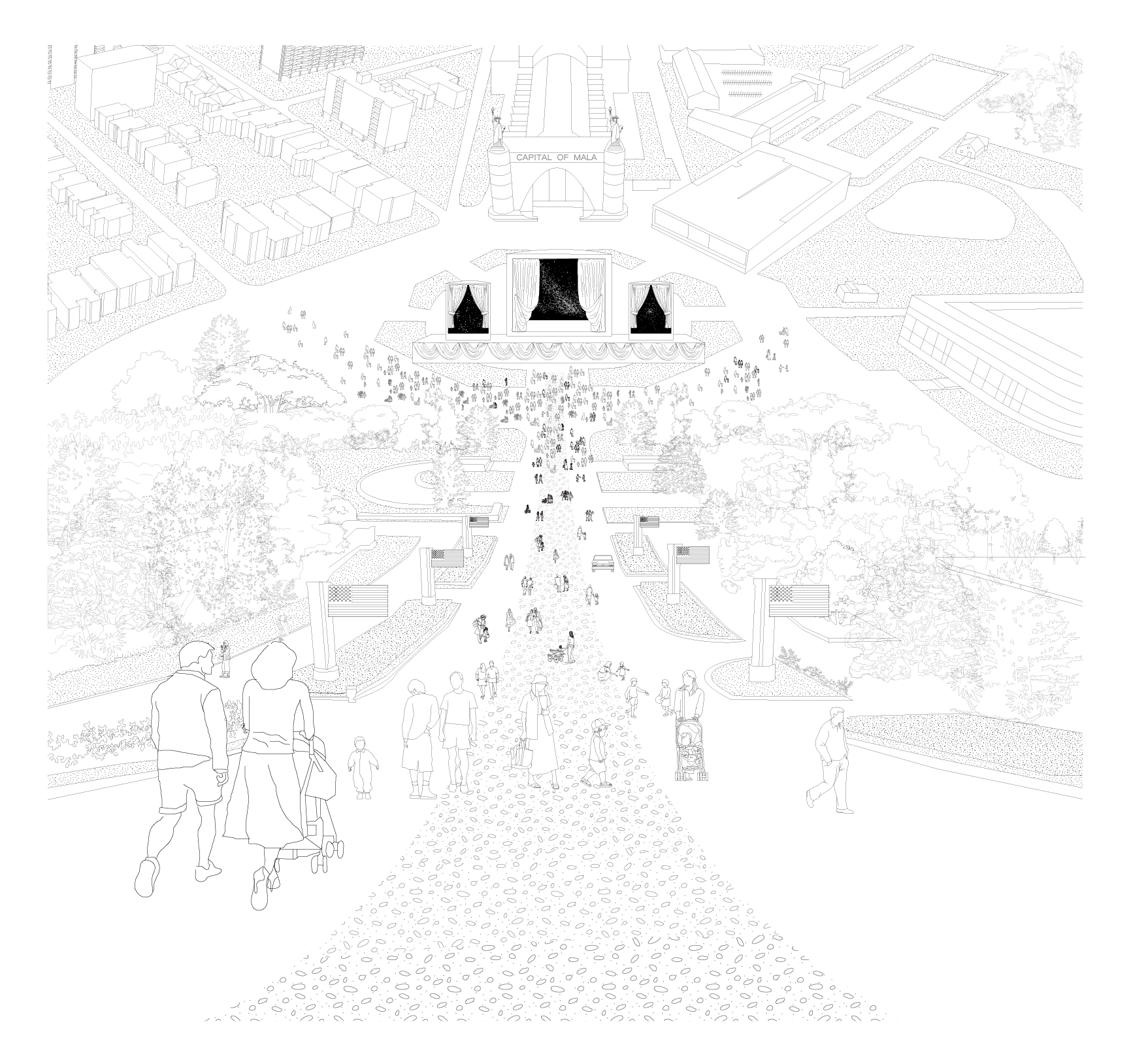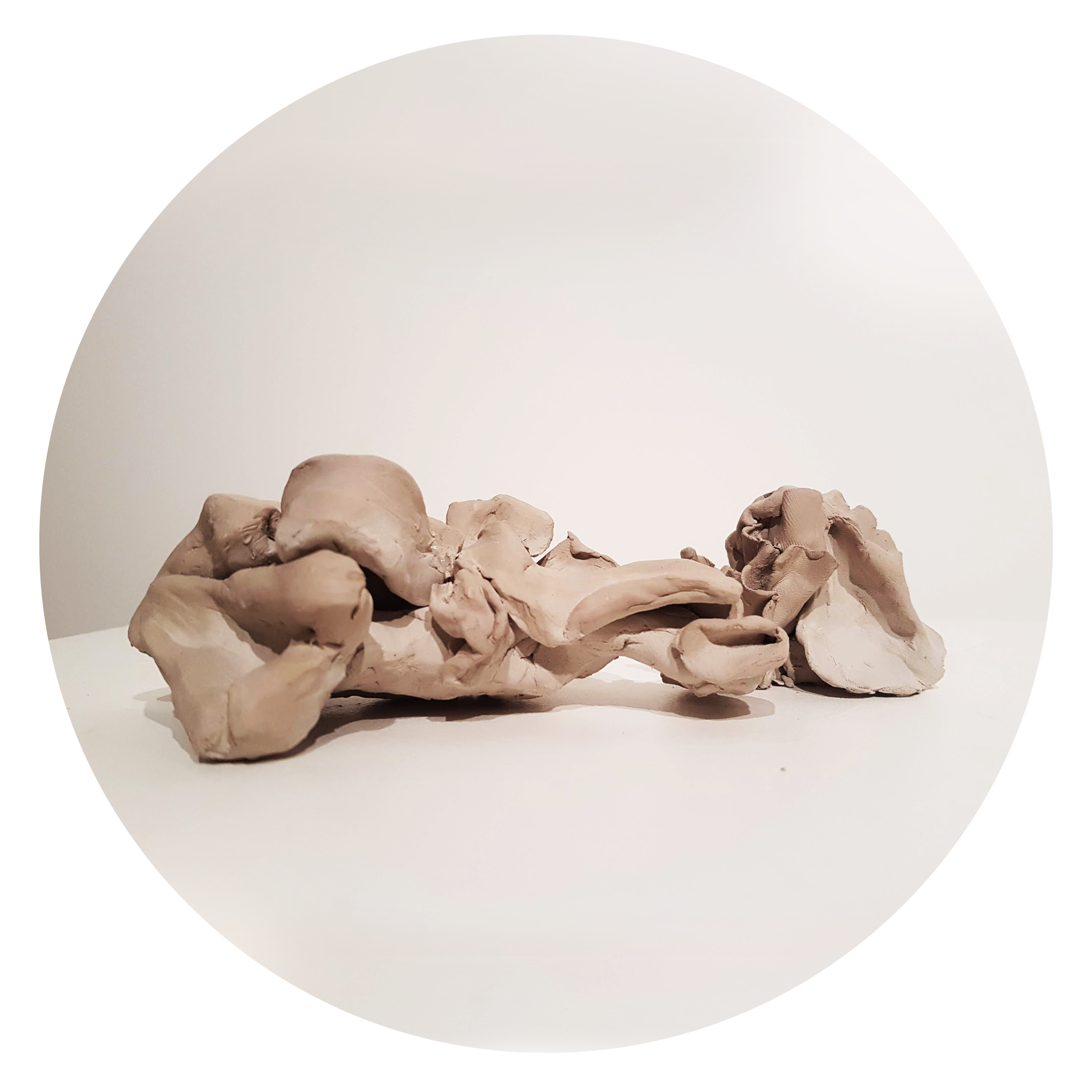
TwoFold
Blank Space Competition Entry, 2019
Project Partners: Haiqa Nisar, Veny Adilia Puspasari
May, 2019
Blank Space Competition Entry, 2019
Project Partners: Haiqa Nisar, Veny Adilia Puspasari
May, 2019
As part of the storytelling and illustration competition, this project imagines a future living condition that is split between Earth and its atmosphere. Powerful countries race to create extensions of their nation on Earth’s atmosphere as Earth’s condition deteriorates with mankind’s continuous exploitation of the environment. The story follows the narratives of Whitmore, an American living in Chicago, and Orsen, an American living in Mala – America’s atmospheric state. The two characters demonstrate the debate on whether people are to stay on Earth or to migrate to the atmospheric state altogether. The story revolves around the belief that it is in our human nature to reach further than our grasp, to hunt for answers and build homes in them, while knowing such ambitious acts may lead to our own destruction. Atmospheric nations create a “Shell” in low-Earth orbit with countries claiming their territory on a first-come-first-serve basis. Overtime, the Shell grows organically and is in a never-ending process of building and re-building. That is, until Earth’s gravitational pull threatens the existence of the Shell.

Whitmore |
Fermi National Accelerator Laboratory, Chicago, IL, USA (EARTH)
“America’s coming around again,” I tell Orsen, watching the shell reach orbit just over Chicago. It casts a crooked, sprawling shadow over the half-empty buildings.
Orsen can’t see me from up there, of course. All I can do is look out of my office window with my phone on speaker, shield my eyes against the eclipsing sun, and pretend that a raised hand passes as a wave from ground level.
But Orsen likes to joke about it anyway.
“You changed your hair?” she chuckles. “I always liked the blonde.”
I could almost see her then; sprawled in her desk chair up in her own office in the planning and infrastructure Ministry. She sent pictures down a while back but the sight of the shell almost nauseated me. I know how madly in love with it she is--that fantastical and strange and exciting feeling of looking down past the clouds and knowing you’re a part of a web of continents, a thick mechanical layer of second chances wrapped around the atmosphere, beckoning down to the simpletons like us with promises of a new world. I can’t stand it.
“Don’t tease,” I chide, switching to business. The strings that connected us from Earth to shell were not just personal. “I have some updates for you to pass on to the Ministry.”
The speaker crackles with her sigh. “This would be a lot easier if you just moved up here.”
“I’m perfectly capable of examining ground samples and reporting back to your division from my Earthling apartment, Orsen. We’re not having this conversation again.”
“I love having this conversation again. The Governor wants to bring the whole environmental division up here during the next migration. It’s not just about ease of access anymore—we can work remotely. Our research is safer up here. You’re safer up here.”
“It’s not about safety to me. You know that.”
“I know,” she says, and it was true. The people up there all know, but they don’t understand. We belonged to the Earth. No matter how hard we tried, we’ve never been able to stray far from our roots; venturing far past the atmosphere and dying, again and again and again, and always going back for more. We don’t know when to stop.
Orsen believes it’s in our human nature to reach farther than our grasp. To hunt for answers and build homes in them, all the while knowing they will become our graves. Curiosity killed the cat, she liked to say, but it frightened me sometimes; the way she said it with a wistful, faraway glaze in her eyes and a smile on her lips.
“You hear that sound?” Governor Grayson said, pressing a key on his desk that pulled down the soundproof locks and let the room erupt in cheers. “I hate to be a romantic, but it really does something to your heart, knowing you’ve won.”
Outside the Governor’s office, in the main boulevards of the shell, explosions of laughter and whooping and singing rang through the air. All inhabitants were now dispersing from the city hall at the nationwide central base, where they celebrated the arrival of a new group of families, making the American shell the first state in the low Earth orbit to reach 2 million inhabitants. We no longer had the barrier of being in-between other cities, mountains, or natural resources required to keep expanding. Each group traveled to Mala—the shell—with their own layouts. We arranged buildings and streets differently than others, a never-ending process of build and rebuild. There is no edge to us, the people sing. We build bridges as soon as new groups come up. Still retained by Earth’s gravitational pull, no part of our state touches the Earth more than twice a year, when the extraction stations pull out their legs and reach back down to Earth to refuel our natural resources.

Orsen | Governor’s Office -- Capital of Mala, USA (ATMOSPHERIC STATE)
Exploring Mala is like exploring all the memories of each group at once. You come across segments of familiar cities and objects next to one another, forging bonds, intertwining histories and memories, seeking a form. This is why moving here is so celebrated, so historically glorious. America’s 51st state, reigned now by Governor Grayson after fifteen years of prosperity, and it’s still bursting with prospects of development.
That was the problem.


“As the head of the Planning and Infrastructure Ministry, sir,” I begin. “I’m inclined to inform you that this victory may be short lived. We received concerns from ground base about the rate of expansion to the southern leg. It is…not wise to move ahead with development to the secondary housing complexes until we receive further information from our division downstairs.”
“Investigation into instability levels across the crust. The atmosphere already cannot withstand the shell’s present mass. These concerns can no longer be ignored—further development must be postponed until we can accommodate for the additional mass compromising atmospheric stability.” A pause. “Sir, the shell began as a temporary holding station. Its purpose was never to outrun national superpowers for two hundred years. To put it simply and rather urgently—we cannot expand any further without risking a planet-wide collapse.”
The Governor still hasn’t shut off the laughter. It rings in the room, bouncing off every wall, drowning out my words. He has to be doing this on purpose. He just became the most powerful man on base next to the President.
Fear cracks through me. The more people move up here, the more popular the belief that makeshift states like Mala, and the men who run it, are the answer to Earth’s problem. It’s hard to despise the claim that atmospheric cities have improved the conditions of human life when you’re living it, celebrating it on commemorated holidays like today. Especially when the Earth is in its worst condition—the Governor has the unfazed support of even the half-hearted victims of floods, earthquakes, boiling heat and impossible cold. They all began with the hope to survive, and when they moved here and fell for his charm, became believers. They think there is no other way of saving themselves. They have no reason to believe they are doomed.
“Information regarding?”
“Investigation into instability levels across the crust. The atmosphere already cannot withstand the shell’s present mass. These concerns can no longer be ignored—further development must be postponed until we can accommodate for the additional mass compromising atmospheric stability.” A pause. “Sir, the shell began as a temporary holding station. Its purpose was never to outrun national superpowers for two hundred years. To put it simply and rather urgently—we cannot expand any further without risking a planet-wide collapse.”
The Governor still hasn’t shut off the laughter. It rings in the room, bouncing off every wall, drowning out my words. He has to be doing this on purpose. He just became the most powerful man on base next to the President.
Fear cracks through me. The more people move up here, the more popular the belief that makeshift states like Mala, and the men who run it, are the answer to Earth’s problem. It’s hard to despise the claim that atmospheric cities have improved the conditions of human life when you’re living it, celebrating it on commemorated holidays like today. Especially when the Earth is in its worst condition—the Governor has the unfazed support of even the half-hearted victims of floods, earthquakes, boiling heat and impossible cold. They all began with the hope to survive, and when they moved here and fell for his charm, became believers. They think there is no other way of saving themselves. They have no reason to believe they are doomed.
“Great leaps, Orsen,” he says to me, and the people’s laughter blends into his. “That’s what they said about our ancestors landing on the moon. One small step for man…”
I finish for him and he grins.
“The kind of mindset we need on this state going forward,” he says above the invisible cheering, the hidden chants of victory, “is that great leaps have become our normal. And in the process, we have to leave some things behind. You are correct—the race isn’t between us and China, or Iraq, or Russia or Mexico. And it’s not between us and Earth.” He rebuttons his suit coat and turns to address the crowds waiting outside for him. “We’re leaping out of humankind into something new.”

We were never building something new. The shell was never meant to exist on its own, by itself, as a second, better version of Earth. We were always going to be tied down to it not just in destruction, but in memory. This was just another attempt at a foreign land, made to drown out the echoes of our nature that followed us wherever we went.
Days after the celebration, the Governor calls the Ministries for an unplanned meeting.
We are running out of time, I want to say, but whose authority is on my side? I stand there in the heart of our metal coffin, as I have since the first day I moved here, but now with the realization that the struggle has finished. There is no more work to be done. We are just waiting to be buried.
Days after the celebration, the Governor calls the Ministries for an unplanned meeting.
“Our district is scheduled to arrive three days earlier than England,” he is saying as I stumble into the control base. His face is calm, eyes sharp. The right reaction of a wrong leader.
“They have already claimed the territory as theirs,” counters the head of Foreign Affair Department. “With all due respect, the best course of action is to postpone operations and discuss this with the President before we begin the next expansion.”
We are running out of time, I want to say, but whose authority is on my side? I stand there in the heart of our metal coffin, as I have since the first day I moved here, but now with the realization that the struggle has finished. There is no more work to be done. We are just waiting to be buried.
concept and images produced by
Haiqa Nisar, Veny Adilia Puspasari, and Andrew Chun-An Wei
text written by Haiqa Nisar
text written by Haiqa Nisar
